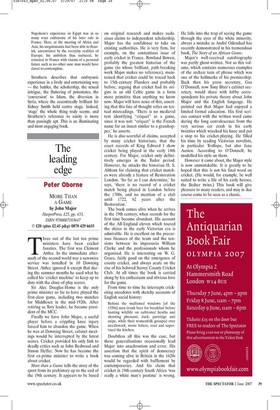Drang nach Osten
Allan Mallinson NAPOLEON IN EGYPT: THE GREATEST GLORY by Paul Strathern Cape, £20, pp. 496, ISBN 9780224076814 © £16 (plus £2.45 p&p) 0870 429 6655 Another book on Napoleon, or General Bonaparte as the author properly notes, though only because the man had not crowned himself emperor when he invaded Egypt. Insisting on calling him General Bonaparte, as an Englishman should, is now, alas, regarded as mere pedantry. If you type 'Napoleon' into the British Library catalogue, the result (13 May) is 10,861. So Paul Strathem, philosopher, mathematician, novelist and historian of the Medicis, is certainly labouring against the odds in offering us more. Except that his eclectic qualifications are probably as good as any historian's when it comes to making sense, and making interesting, the extraordinarily muddled, vainglorious adventure that was this half-military, half-philosophical expedition.
To begin with, the book leaps off the shelf-display into the hands: the dustjacket is a remarkably fine reproduction of a painting of 'Napoleon and his general staff in Egypt' by Jean Leon Gerome, all sun and sand, heat and dust, camels, Bedouin and fine uniforms: East meets West (or vice versa). There are excellent illustrations within, too, some in colour, although it is a shade disappointing there are not more, for the glory of the expedition was not, in the end, the military side, the work of the soldiers, but that of the savants who accompanied Bonaparte and brought back so much that threw light on the mystery of the ancient Egyptians, not least, of course, the Rosetta stone, as well as a new fashion for all things near-eastern.
Was the enterprise a serious attempt to capture British India? It certainly does not measure up to the Napoleonic reputation for strategy, except for that part of his strategy which was purely the gambler's throw. Several recent histories have attempted to show that gambling was in fact all Napoleonic strategy ever really amounted to. This is what the general told his troops as they were assembling for embarkation (for the largest amphibious operation in history to that date): Soldiers of the Army of the Mediterranean! . . . You have campaigned in the mountains, in the plains and before fortresses; but you have yet to take part in a naval campaign. The Roman legions that you have sometimes rivalled, but have yet to equal, fought Carthage on this very sea ... Victory never forsook them ... Europe is watching you. You have a great destiny to fulfil, battles to fight, dangers and hardships to overcome. You hold in your hands the future prosperity of France, the good of mankind, and your own glory. The ideal of Liberty that has made the Republic the arbiter of Europe will make it also arbiter of distant oceans, of faraway countries.
It is difficult, if not impossible, to imagine Wellington, or for that matter any of his generals, addressing his 'scum of the earth' thus. But then Bonaparte's men were still inspired by revolutionary zeal, and by their extraordinary success (and bounty) in Italy. And the general himself was bent on 'missionary' work in the fashion of his idol's, Alexander the Great's, intent to Hellenise the Orient.
But what the assembling armada's objective was perplexed His Majesty's ministers: was it Portugal, or Sicily, or even Brazil? In April 1798, Pitt the Younger summoned his cabinet to review the intelligence on the build-up of troops and transports which his spies were reporting in Toulon, Marseille, Ajaccio, Genoa and Civitavecchia. The cabinet concluded that the most dangerous option was also the most likely, that the armada would break out of the Straits of Gibraltar, join up with the French Atlantic fleet off Brest, and proceed to the invasion of Britain or Ireland.
Thank God for Nelson, for the French managed to set sail with their destination still a mystery to the spies. After beating up and down the Mediterranean for a month in a fruitless search for them, Nelson arrived off the Peloponnese and sent Captain Troubridge of the Culloden ashore, where he learned that Bonaparte had invaded Egypt, which intelligence was apparently confirmed by the capture soon afterwards of a French brig bound for Alexandria and loaded with wine. What better confirmation could there be?
The battle of the Nile, the audacity and skill of which ought to have warned Bonaparte of the later defeats he would suffer at the hands of England's best (he might surely have imagined that Nelson was not unique in his military prowess?), marooned his army in the Middle East. Eventually the general abandoned them, as he did the army after 1812, and skulked back to Paris to secure his future. As Strathern puts it: Napoleon's experience in Egypt was in so many ways embryonic of his later rule in France. Here, at the meeting of Africa and Asia, his megalomania had been able to flourish, unrestricted by the everyday realities of Europe; his ambition thus nurtured, he returned to France with visions of a personal future such as no other sane man would have dared to contemplate.
Strathern describes that embryonic experience in a lively and entertaining way — the battles, the scholarship, the sexual intrigue, the flattering of potentates, the 'conversion' to Islam, the diversion in Syria, where the eccentrically brilliant Sir Sidney Smith held centre stage. Indeed, 'stage' the whole thing truly seems; and Strathern's reference to sanity is more than passingly apt. This is an illuminating and most engaging book.





















































 Previous page
Previous page